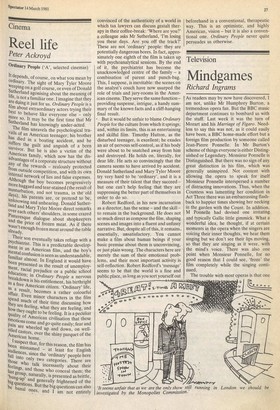Cinema
Reel life
Peter Ackroyd
Ordinary People ('A', selected cinemas) It depends, of course, on what you mean by ordinary. The sight of Mary Tyler Moore weeping on a golf course, or even of Donald Sutherland agonising about the meaning of life, is not a familiar one. I imagine that they are doing it just for us. Ordinary People is a film about extraordinary actors trying their best to behave like everyone else — only more so. It may be the first time that Mr Sutherland has knowingly under-acted. The film unravels the psychological travails of an American teenager; his brother has died in a boating accident, and he suffers the guilt and anguish of a born survivor. But he is also a victim of the American family, which now has the disadvantages of a corporate structure without any of the rewards — zealously protected from outside competition, and with its own internal network of lies and false expenses. Although the boy becomes progressively more haggard and tear-stained (the result of masturbation, and not trauma, in the old days), his parents are, or pretend to be, Unknowing and unhearing. Donald Sutherland and Mary Tyler Moore direct remarks over each others' shoulders, in some crazed Pinteresque dialogue about shopkeepers and the price of frozen meat. As if there Wasn't enough frozen meat around the table already. Their son eventually takes refuge with a psychiatrist. This is a predictable development in an American film, and the boy's mental confusion is seenas understandable, familiar almost. In England it would have been presented as the result of unemploYtnent, racial prejudice or a public school education; in Ordinary People a nervous breakdown is his entitlement, his birthright as a free American citizen. 'Ordinary' life, as a result, becomes a rather colourful affair. Even minor characters in the film spend much of their time discussing how they are feeling, what they are feeling, and how they ought to be feeling. It is a peculiar quality of American civilisation that these emotions come and go quite easily; fear and Pain are wheeled up and down, on welloiled castors, over the shiny parquet of the American home.
suspect that, for this reason, the film has been misnamed — at least for English audiences, since the 'ordinary' people here fall into only two categories. There are those who talk incessantly about their feelings, and those who conceal them; the last group, naturally, is presented as brittle, `hung-up and generally frightened of the be questions. But the big questions can also be banal ones, and I am not entirely convinced of the authenticity of a world in which tax lawyers can discuss gestalt therapy in their coffee-break: 'Where are you?' a colleague asks Mr Sutherland, 'I'm losing you these days. Are you off the track?' These are not 'ordinary' people: they are potentially dangerous bores. In fact, approximately one eighth of the film is taken up with psychoanalytical sessions. By the end of it, the psychiatrist has become the unacknowledged centre of the family — a combination of parent and punch-bag. This, I suppose, is inevitable: the scenes on the analyst's couch have now usurped the role of trials and jury-rooms in the American cinema. They serve the same function — providing suspense, intrigue, a handy summary of the known facts and a cliff-hanging final result.
But it would be unfair to blame Ordinary People for the culture from which it springs; and, within its limits, this is an entertaining and skilful film. Timothy Hutton, as the disturbed teenager, is excellent; he exudes an air of nervous self-control, as if his body were about to be snatched away from him and destroyed. He holds on, literally, for dear life. He acts so convincingly that the camera seems to have arrived by accident. Donald Sutherland and Mary Tyler Moore try very hard to be 'ordinary', and it is a measure of their talent that they succeed — but one can't help feeling that they are suppressing the better part of themselves in order to do so.
Robert Redford, in his new incarnation as a director, has the sense — and the skill — to remain in the background. He does not so much direct as compose the film, shaping scenes and images into a fluent and unfussy narrative. But, despite all of this, it remains, essentially, unsatisfactory. You cannot make a film about human beings if your basic premise about them is unconvincing, or just plain wrong. The characters here are merely the sum of their emotional problems, and their most important activity is self-reflection. Robert Redford's 'message' seems to be that the world is a fine and public.place, as long as you sort yourself out beforehand in a conventional, therapeutic way. This is an optimistic, and highly American, vision — but it is also a conventional one. Ordinary People never quite persuades us otherwise.






































 Previous page
Previous page